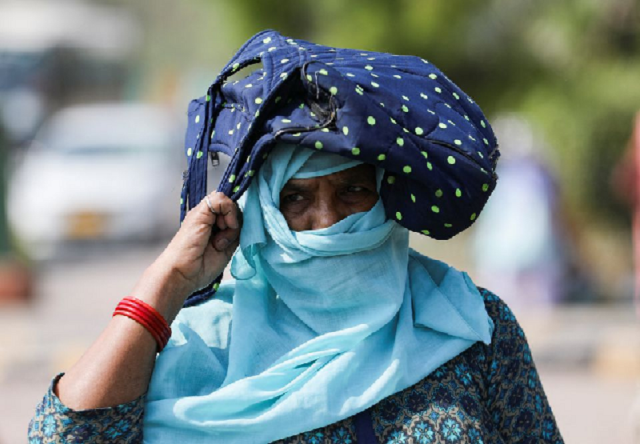‘Women suffer more from climate change than men’
Sherry says engagement with the UK will provide support to Pakistan in several areas

Women are more vulnerable to the effects of climate change than men and they suffer more from the impacts of climate stress as compared to their male counterparts in developing countries, Federal Minister for Climate Change Senator Sherry Rehman and leading environmental experts noted on Thursday.
The federal minister while emphasising that climate stress was a pressing concern for Pakistan said that engagement with the United Kingdom through a dedicated bilateral dialogue will provide support to Pakistan in several areas that can help with the real progress towards implementation of the Nationally Determined Contributions – a climate action plan to cut emissions and adapt to climate impacts.
“Women suffer more from the impacts of Climate Stress as compared to their male counterparts in developing countries and a policy which focuses on gender mainstreaming and adaptation efforts to the impacts of Climate Stress must also be rolled out,” the Senator said in a meeting with the British High Commissioner Christian Turner.
Rehman said that gender mainstreaming of climate policies was essential and Pakistan and it is high time that Pakistan articulated several pressing climate issues into policy. She said that Pakistan needed innovative, bold and far-reaching solutions that cover not just investments in nature to curtail deforestation, but also an infrastructure for energy transition, investment in renewables, and resilient infrastructure whilst still humanizing the climate change conversation for the general population.
UK government’s COP26 Regional Ambassador to Asia-Pacific and South Asia Ken O'Flaherty while talking to The Express Tribune also said that the UN has found that women were more vulnerable to the effects of climate change than men around the world, saying they constitute a large majority of the world’s poor and often depend on small-scale farming for a livelihood, which is particularly vulnerable to climate change.
Also read: Intense heatwave sweeps across country
“Women and children can comprise 80% of those displaced by climate-related disaster,” Ken said, saying addressing gender inequality has also been proven to advance efforts to tackle climate change. It is women, girls and those who are already most marginalised, that will be most severely impacted by climate change, he said but added that they also have a critical role to play to address the climate crisis.
“The UK is committed to addressing this dual challenge head-on, and has committed funding to empower communities and women’s groups to take locally-led adaptation action, to build local, national and global resilience,” Ken said.
Sara Hayat, a climate change expert, told The Express Tribune that women in Pakistan are affected in a number of ways by climate change. Culturally, the expert said, women are responsible for domestic chores and looking after their families and the lack of firewood and dearth of water impairs their ability to complete daily household chores.
Water collection was another aspect, Sara while referring to a report by Oxfam said, saying women travel for an average of two kilometres daily for water collection. She said that women are exposed to wild animals, and sexual harassment and suffer malnutrition because of how much effort it takes for them to go and collect water from far-flung areas.
“It takes an overall toll on their health,” Sara said, adding backaches and hair loss make them emotionally frustrated.
For her, the second aspect of climate change is the impact on the livelihood of women because they don’t have very diversified sources of livelihood. Generally, Sara said, women’s source of income comes from agriculture, fisheries and livestock rearing. Since, she said, climate change adversely affects all these three areas so women’s sources of income or livelihood are greatly impacted by climate change.
“In natural disasters,” Sara maintained, “14 times more women than men die.” She said that the results were obtained from a study conducted in Bangladesh as no such study was ever conducted in Pakistan. “The reason is: women are not taught life-saving skills,” she incorporated, saying they don’t know how to swim or climb trees and that’s why they suffer more during natural disasters.
Sara said that in order to address the gender impacts of climate change is to formulate gender-sensitive policies, teach women life-saving skills and enhance income generation for them. She said that the policies should cater to the diversification of livelihood of women, saying it was important to involve women, especially those who are expecting or the adolescent girls, from the federal level in the development and execution of policies.
Also read: Ministry of Climate Change issues heatwave alert to all provinces
International Climate Change & Gender Specialist, Dr Qamaruz Zaman Chaudhry, said that climate change is not gender-neutral as women are disproportionately (and, often, more severely) affected by its impacts. “Gender-based inequities lead women to face more adverse climate change impacts than men,” Chaudhry said.
The same holds true with disasters, Chaudhry said, adding women are particularly exposed to disaster risks and are likely to suffer higher rates of mortality, morbidity and post-disaster ruin to their livelihoods.
Investing in women as part of the climate change adaptation and disaster risk reduction effort can lead to greater returns across the Sustainable Development Goals, he said, saying “women are key agents of change” and their unique knowledge is essential to ensure the effectiveness and sustainability of climate change adaptation and disaster risk reduction efforts. “Women’s full and effective participation is indispensable,” he concluded.



















COMMENTS
Comments are moderated and generally will be posted if they are on-topic and not abusive.
For more information, please see our Comments FAQ